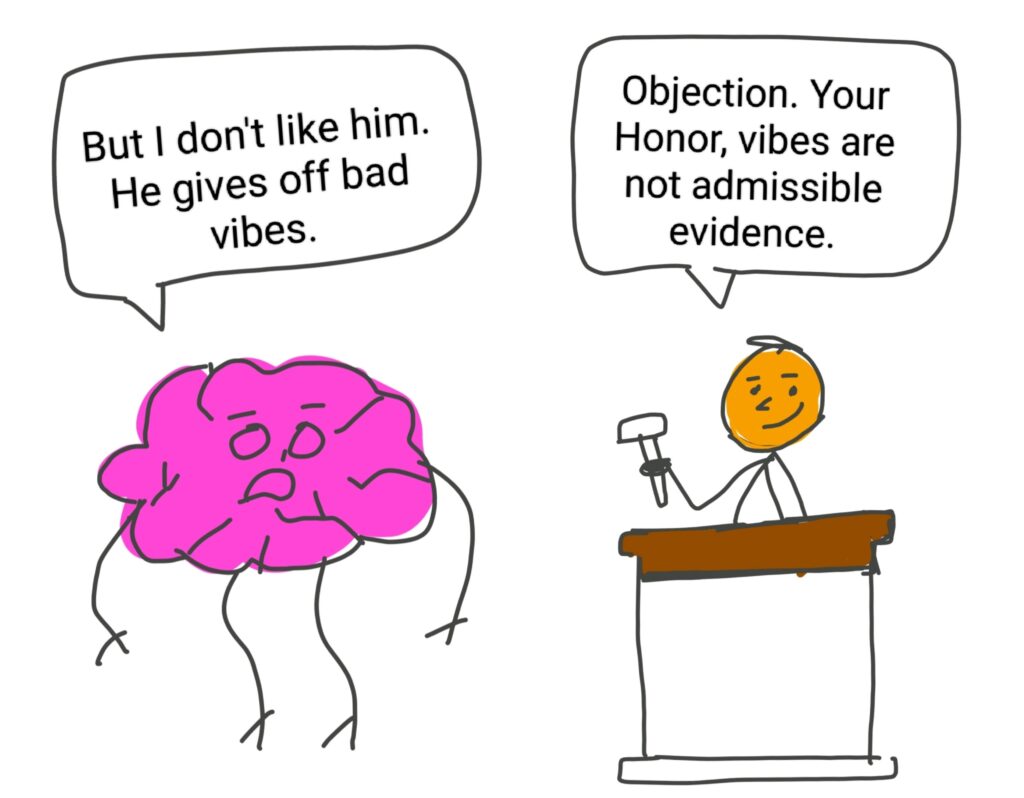Introduction
Let’s kickstart with an example!
Imagine yourself in the midst of a heated debate with your classmates. You are killing it with your arguments!
But wait, your friend fires back at you with, “You literally failed the last exam; you think you’re an expert now?”
Annoying, right? Instead of actually responding to what you said, they went straight for you. That’s what we call an ad hominem fallacy, and trust me, it’s everywhere—social media, political debates, even casual conversations with friends and family.
You might think it’s easy to detect, but you will be surprised to know that your brain totally falls for it. Instantly emotions take over, and logic? Out the window.
Meanwhile, the law? It doesn’t entertain ad hominem arguments.
So why does your brain love personal attacks, and why does the legal system ignore them completely? Let’s break it down.

What is an Ad hominem attack?
Ad hominem fallacy: the words come from Latin, meaning “to the person.” When a person tries to discredit you instead of addressing your arguments, they are using an ad hominem attack on you. The goal is to distract you and the audience from your valid arguments and shift attention to your personal traits.
Some common ad hominems would be:
- You’re too young to be talking about politics and diplomacy.”
- Why should we take your advice on relationships? You’re divorced yourself.”
- You are a lawyer; who takes moral lessons from you”?
Real-Life Example: The 2024 U.S. Presidential Debates.
During the debates, candidates frequently attacked each other’s character instead of responding to the policies being discussed. Instead of engaging with an opponent’s economic plan, a candidate might say, “You’re corrupt!” or “You’re a career politician who never got anything done.” This strategy shifts the audience’s focus from policy to personal credibility.
Ad hominem attacks feel powerful because they target who you are rather than what you’re saying. And that’s why they’re so sneaky.
Why Does Your Brain Fall for an Ad Hominem Attack?
Ever heard of “FIGHT OR FLIGHT!” That’s worth discussing here.
1. Your Brain Thinks It’s Under Attack
An insult to your intelligence and credibility activates the amygdala (the brain’s emotional part), and you freak out. It reacts as if an actual danger is approaching you, so you become defensive. If a dog ever chased you down, you know the feeling!
Therefore, you cannot think calmly through the argument and protect yourself.
2. Your Brain Loves Shortcuts
The ad hominem fallacy takes advantage of our existing biases and built-in mental shortcuts.
(i) THE HALO EFFECT—Focusing on either one good or bad trait of someone can distort our perception of them as a person. Hence, one negative trait, and we assume their arguments must be bad.
(ii) CONFIRMATION BIAS—If an attack fits what we already believe about someone, we accept it without question.
(iii) EMOTIONAL REASONING—If an argument makes us feel bad, we assume it must be wrong.
Real-Life Example: Celebrity Scandals
If a famous scientist gets caught in a personal scandal, people may start doubting their work—even if their research is still solid. The personal attack shifts focus from their professional achievements to their private life, creating doubt where none should exist.
3. Social Survival > Logic
Way back in human history, your reputation meant everything. If your tribe didn’t trust you, you were doomed. This is why personal attacks feel so serious, even when they’re logically irrelevant. Your brain still acts like you’re trying to survive in the wild.
Now, let’s talk about how the legal system deals with this mess.

Why The Law Rejects Ad Hominem Attacks
The court is all about evidence, logic, and fairness—not emotional maneuvers.
1. No Irrelevant Attacks
A lawyer cannot attack someone’s personal character unless it’s relevant to the case and criminal history of the accused.
For example, if someone is on trial for fraud, the prosecution can’t just say, “Well, he cheated on his wife, so he must be a liar.” The court doesn’t care. It wants proof, not unreliable assumptions.
2. Burden of Proof > REPUTATION
A bad reputation in the neighborhood would not make someone automatically false. The law requires evidence, not personal comments on someone’s bad behavior in the past.
For example, a witness with a criminal background can still tell the truth in court.
3. Lawyers Attack Arguments, Not People
A skilled lawyer won’t waste time attacking a witness personally. Instead, they’ll expose logical flaws in their testimony. The focus is always on the argument, not on the person making it.
So, how do we outsmart these attacks?
Here’s how:
- Don’t Take the Bait—Start observing these attacks in everyday life and in debates. Once you do that, it becomes easy to not fall for them. Stay cool and take a deep breath. Know that your emotional reaction is a win-win for them.
- Don’t Let It Pass—Call out such attacks openly and bring the person back to the argument.
For example, you can say, “My XYZ character is irrelevant here; can you respond to my actual point?”
- Think Like a Lawyer—Focus on facts, not emotions. Stick to evidence, not personal drama.
For example, “Is this argument logically valid, or is it just attacking the person?”
Or
“My background doesn’t change the facts I presented. Let’s stay on topic.”
Final Thoughts: Think Like a Lawyer, Not Like Your Brain
Your brain loves ad hominem attacks because they’re emotional and personal. The law, on the other hand, ignores them because they’re logically useless.
So the next time someone tries to attack you instead of your argument, don’t fall for it. Instead, think like a lawyer—stay calm, stick to the facts, and keep the conversation focused on logic.
Because in the courtroom of reason, personal attacks mean nothing.